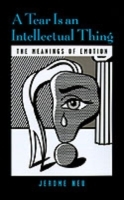Is jealousy eliminable? If so, at what cost? What are the connections between pride the sin and the pride insisted on by identity politics? How can one question an individual's understanding of their own happiness or override a society's account of its own rituals? What makes a sexual desire "perverse," or particular sexual relations (such as incestuous ones) undesirable or even unthinkable? These and other questions about what sustains and threatens our identity are pursued using the resources of philosophy, psychoanalysis, and other disciplines. The discussion throughout is informed and motivated by the Spinozist hope that understanding our lives can help change them, can help make us more free.

